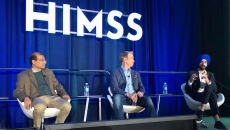Artificial Intelligence
HIMSS24
Every layer of healthcare, from back-office automation to drug discovery, has been enabled by AI, says Sumit Nagpal, CEO, cofounder and board director at Cherish Health.
AI helps answer the "million-dollar question in IVF today: Which embryo becomes a baby?" says Daniella Gilboa, CEO of AIVF.
HIMSS24
The hospital room of the future is about using sensors to augment information for the caregivers, says Michael Brandofino, president and COO of Caregility.
HIMSS24
Robert Havasy, senior director of informatics strategy at HIMSS, says HIMSS24 attendees are showing results from AI use and talking about how to regulate it, as well as whether it could be used to re-focus and speed up interoperability efforts.
HIMSS24
AI-powered tools are being developed, implemented or at least considered by nearly every health system worldwide, says HIMSS President and CEO Hal Wolf. Hear more from industry insiders and leaders as they discuss key takeaways from the 2024 HIMSS Global Health Conference & Exhibition in Orlando.
HIMSS24
AI, cybersecurity, health equity and the evolution to nursing are just some of the topics health leaders discussed at the 2024 HIMSS Global Health Conference & Exhibition in Orlando.
HIMSS24
The partnership grows the portfolio of the clinical surveillance and life sciences side of the business, says Inovalon's Julie Lambert, president & provider GM, and Hayley Burgess, SVP for provider surveillance and safety.
HIMSS24
Healthcare industry leaders and insiders discuss hot topics in focus at the 2024 HIMSS Global Health Conference & Exhibition.
Clinical and technology leaders from Mass General Brigham, AWS and GE HealthCare came together at HIMSS24 to discuss what's needed to move AI forward.
HIMSS24
High-quality imaging coupled with computer technologies for the eye could be used in the future to identify strokes, before they happen, and cardiovascular disease, but interoperability challenges remain, says Kerry Goetz, associate director, NEI Office of Data Science and Health Informatics.









